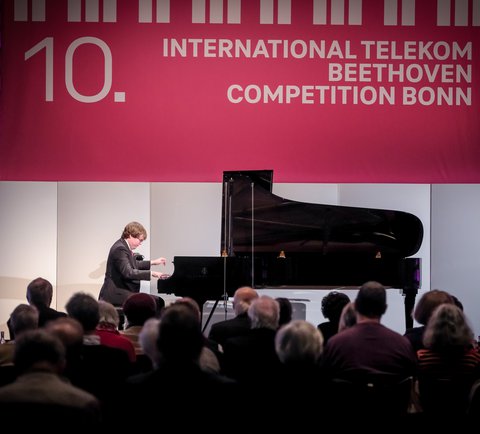He won the International Telekom Beethoven Competition 2023 – the US pianist Caleb Borick will be performing at the Bonn Opera during Beethovenfest with a world-class orchestra behind him, the Deutsches Symphonie-Orchester Berlin. We asked him five questions.
5 Questions for...
Pianist Caleb Borick

Caleb, take us into your everyday life: What does a typical ›working day‹/›practicing day‹ look like for you?
I generally avoid a regimented practice schedule and instead practice when I feel the drive to do so, because I find it important to practice out of love for the music and not for any other reason. I feel this makes my practice much more productive than it would be otherwise, and enables me to practice quite a lot without burning out.
You deliberately chose Brahms’s Second Piano Concerto – what fascinates you about this work and Brahms’s piano works in general?
The Brahms B-flat Major concerto is a unique work. Brahms dryly described it in letters to friends as »a little piece« with »a tiny wisp of a scherzo«, and really, the exact opposite of this is true. The orchestration is massive, essentially on par with what he calls for in his four symphonies, the concerto is of near-unparalleled length, and the scherzo is a colossally thunderous endeavor. I am so excited to share it with the audience in Bonn this September.
You perform the piece with the Deutsches Symphonie-Orchester Berlin – what are the roles of soloist and orchestra?
Though there are plenty of virtuoso solo passages in the piece, it is unique for its deep interweaving of the orchestral part with the solo part. There is so much interactivity and exchange between the orchestra and the pianist that it almost seems like chamber music, just on a much larger scale. In those regards, this piece is a special one, but it has throughout the rich textures and great depth of feeling that define so much of Brahms’ work in general.
With a length of 50 minutes, the concerto is one of the longest ever. The Telekom Beethoven Competition also asks a really large repertoire. How did you prepare for having such a large amount of repertoire ready at the same time?
Much of my reasoning for applying to the Telekom Beethoven Competition was that, though it has rather exhaustive repertoire requirements, all of the music it requires is music I hold close to my heart. It required a great deal of work to keep all of the repertoire in performing condition, but I didn’t view it as work, and more so as an exciting and rather rare opportunity to explore vast amounts of really incredible music. Every piece the competition requires is special and personally important to me, ranging from the youthful vitality of early Beethoven to the transcendent universality of his later works, and that made my preparation feel in sum not burdensome at all.
The motto of this year’s Beethovenfest is »Miteinander« (meaning »Together«), alluding to the 75th anniversary of the German constitution. What role do you think political messages play in the (classical) music world?
I think art is often inseparable from politics, and classical music is no exception to that. Moreover, what is so special about music in particular is that it is a medium that transcends languages and barriers. One does not need to understand German to feel, for example, the sense of humanity and fellowship conveyed by Beethoven’s 9th symphony. Because music is capable of conveying that sort of philosophical point, I find it actually quite important that we do not try to sever it from politics. Music can instill a feeling of connectedness among vastly different people, and it is exactly that connectedness that is crucial to keep in mind to enable us to act and make decisions in a manner that is kind, compassionate, and considerate of others.
Caleb Borick at Beethovenfest 2024
- , Opera Bonn
Deutsches Symphonie-Orchester & Caleb Borick
Deutsches Symphonie-Orchester Berlin, Caleb Borick, Lionel Bringuier
Farrenc, Brahms
